Editor:
Brandon Sweet
University Communications
bulletin@uwaterloo.ca
IBET PhD Project to represent Waterloo in federal competition
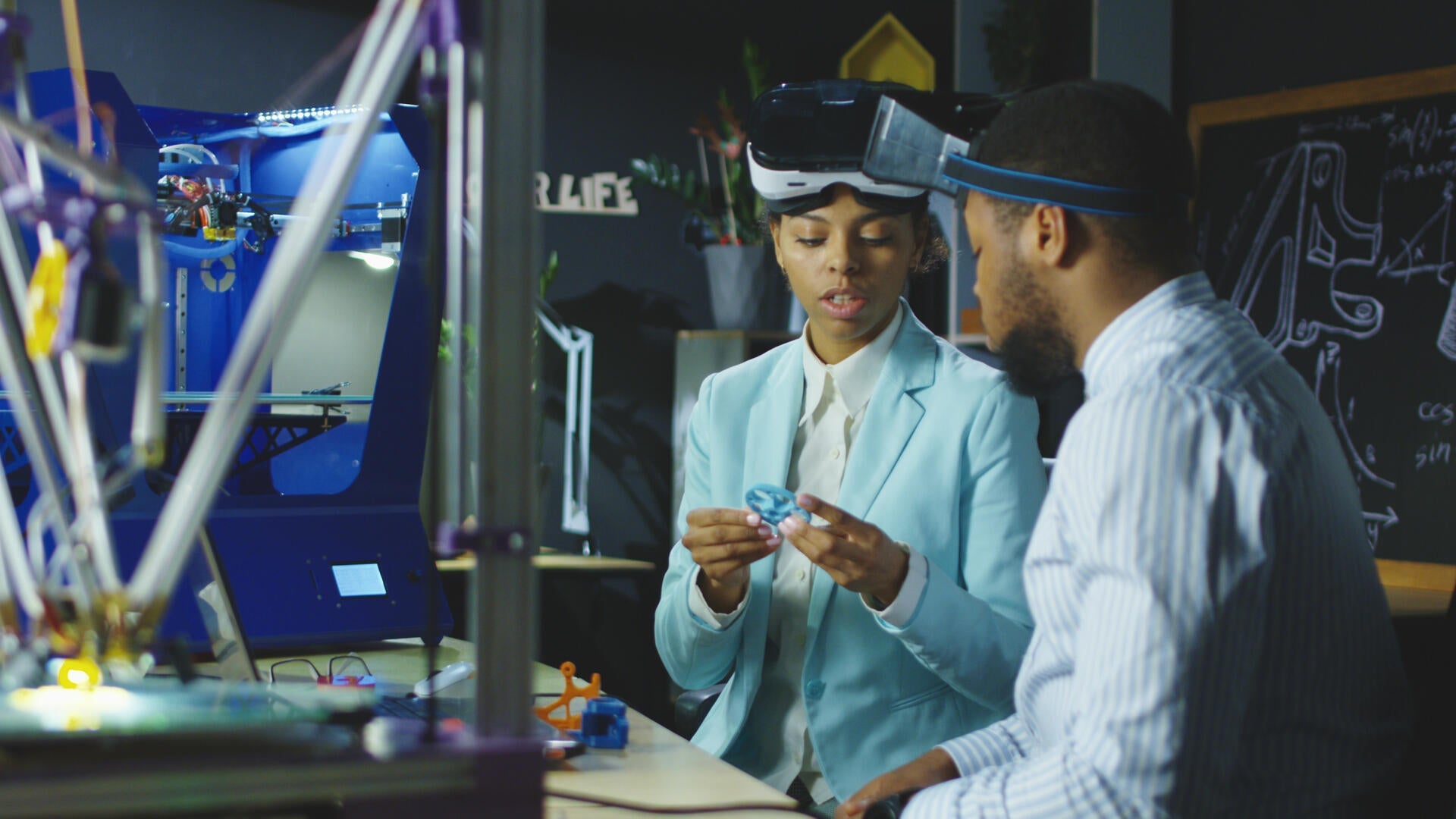
This article was originally published on Waterloo News.
An innovative new program that provides financial support, mentorship and networking to Black and Indigenous PhD students has been chosen to represent the University of Waterloo in a federal competition for bold and potentially game-changing projects to address persistent systemic barriers in the research ecosystem and academia.
The Indigenous Black Engineering Technology (IBET) PhD Project, led by Tizazu Mekonnen, associate professor of chemical engineering, is aimed at rapidly increasing the presence of Indigenous and Black academics in engineering and computer science across Canada. Launched only 18 months ago, the program has expanded to 15 universities across Canada with 28 Momentum Fellows in the 2021 and 2022 cohorts.
Along with $120,000 over four years to support the costs of PhD studies, IBET fellows are matched with mentors of their choice from industry or academia. IBET fellows are also able to pursue an internship with an industry partner through an attractive MITACS partnership that incentivizes industry partners.
IBET was chosen as the University’s nomination for the inaugural Robbins-Ollivier Excellence in Equity Award following an online vote for Waterloo employees and students in May and an internal selection committee deliberation. Two other applications, Becoming Coalition and Structured Undergraduate Research Experience (SURE), were also part of the online campus vote.
If the IBET project is awarded the $100,000 Excellence in Equity award, Professor Mekonnen would like to focus on increasing the number of Indigenous PhDs in the program. Currently only two of the 28 Fellows are Indigenous.
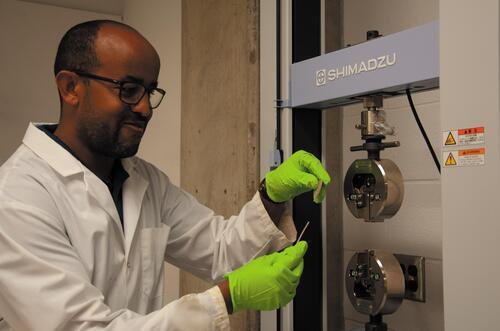
Tizazu Mekonnen, associate professor of chemical engineering, is leading the Indigenous Black Engineering Technology (IBET) PhD Project, aimed at rapidly increasing the presence of Indigenous and Black academics in engineering and computer science.
“Right now, we’re very successful in terms of attracting Black students but on the Indigenous front we’re struggling a little bit,” he says. “My hope is we are going to continue to attract more successful students and a key success is to see the students finish the program, get employment and become role models for future engineers.”
Professor Mekonnen would like to see more than 100 fellows at the peak of the program to increase the overall number of Black and Indigenous people trained at the PhD level. When the IBET program started, there were less than 15 Black professors out of more than a thousand in Ontario and he says he was the only Black professor out of nearly 350 faculty in Waterloo Engineering. In Canadian society, about four per cent of people are Black and five per cent are Indigenous.
For IBET fellows the mentorship experience goes beyond core studies and work and extends to social and cultural experiences.
“Fellows want someone who can support their cultural growth and safety in this new environment,” says Mary Robinson, associate dean for Outreach, Equity and Diversity in the Faculty of Engineering.
The IBET PhD program is also educational for the PhD advisors and IBET mentors in understanding student needs.
“The advisors and mentors may not have experienced life as a Black person or an Indigenous person so there’s a lot of education going on while supporting these students. This type of work starts a cultural shift so that the University is more prepared, and more aware of how to create a more inclusive welcoming environment while making changes to the whole system to make it more inclusive,” says Robinson.
Study looks at how digital religion is shaping spirituality among millennials
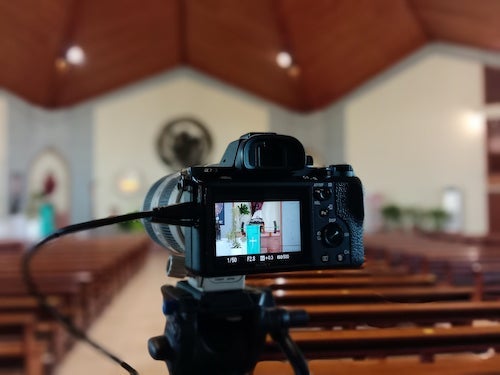
The growing trend of digital religion among US and Canadian millennials mostly complements, not substitutes, in-person participation in organized religion, a new study found.
As digital forms of communication increased, many in the religious community saw an opportunity to stem the tide of secularization in North America. The study by University of Waterloo sociology professor Sarah Wilkins-Laflamme explores if digital technologies facilitate a ‘spiritual revolution’ and if they provide important spiritual and religious spaces for new segments of the population removed from more conventional forms of organized religion.
“We know that more and more people are turning towards digital mediums for spirituality such as chat groups with pastors, online sermons, and religious content on social media,” said Wilkins-Laflamme. “We’ve found that while digital religion isn’t necessarily attracting a lot of new millennials to participate, it is making the experience of those already involved richer.”
Wilkins-Laflamme notes that while digital religion is a phenomenon among many millennials, it’s not a part of the lives of the vast majority of this demographic.
“It is still present though for a sizeable minority of the young adult population, and for many of them, digital religion plays an important complementary role to the in-person practicing of their faith,” said Wilkins-Laflamme.
While past scholarship has examined the adoption of digital religion and its role in spirituality, Wilkins-Laflamme’s report is the first to examine who exactly is practicing it and to what end.
“Social environment does play an important role, with digital religion practices much more prevalent in the generally more religious U.S. context, compared with the generally more secular Canadian context,” said Wilkins-Laflamme. “Digital religion practices are often, but not always, tied to other in-person religious and spiritual activities among millennials.”
The study, Digital Religion Among U.S. and Canadian Millennial Adults, was published in the Review of Religious Research.
This is how you make a dent in the universe
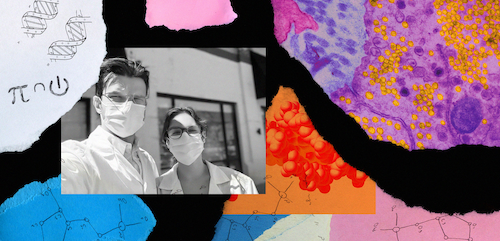
By Rose Simone. This article was originally published in the Spring 2022 issue of Waterloo Magazine.
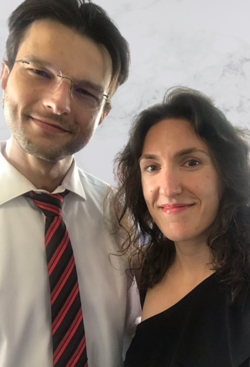
How did Janelle Resch (BMath ’10, MMath ’13, PhD ’19) move from a doctoral thesis on the mathematics of sound waves to becoming a co-founder of a biotech firm at the beginning of a pandemic?
Her story is about the celebrated University of Waterloo innovation ecosystem, but it is also about her education: “Mathematics helps you describe the world around you. Having that logical foundation to look at something from first principles, derive a model, and then test that model computationally, is really important for any field.”
It is also about her husband and co-founder Eric Ocelewski, his cancer diagnosis, and their decision to use their talents to “make a dent in the universe on the early-detection, diagnostics problem.”
Ocelewski, co-founder of their pathogen detection company Π∩ϟ (Pi and Power) now at the Velocity incubator, was diagnosed with invasive squamous cell carcinoma on his tongue and underwent intensive surgery and experimental chemotherapy. His father had passed away from a similar cancer, however, advances in genetic screening allowed the couple to predict Eric’s cancer years before it emerged.
Resch points out: “Eric’s surgery and treatment could have been much more simplified if we had caught it earlier.”
The innovation ecosystem at Waterloo has been fundamental to the growth of Π∩ϟ, but Resch says it is critical to recognize the power of the many people who have stepped up to support and encourage her along the way.
“The University of Waterloo is just buildings, but the people inside them make the difference,” Resch says. “There were people who were really supportive and positive who helped us make this happen.”
Among the people at Waterloo who were important to her company, Resch cites Michael Barnett-Cowan, a kinesiology professor who encouraged them to get into the Velocity program; Jeff Aramini, an epidemiologist and entrepreneur who served as a business advisor when the company got into Velocity; Parisa Hamilton (MASc ’09, PhD ’14), the Velocity space lab manager who helped Resch become more comfortable with lab equipment thereby making the transition from acoustics to biotech smoother, and the late Safieddin Safavi-Naeini, a professor in the department of electrical and computer engineering who died last year but was the director of the Centre for Intelligent Antenna and Radio Systems that collaborated with the company as it sought to investigate empirical data.
From augmented reality to early detection of pathogens
Resch and Ocelewski were initially not even thinking about going into the biotechnology space. They were intent on launching a company that would create virtual and augmented reality environments for research, education, remote testing and training.
But after Ocelewski was diagnosed with cancer, they wanted to find ways for cancer and other pathogens to be detected earlier to prevent suffering, save lives and preserve quality of life for patients and their families.
The company got its first $100,000 investment from a Velocity Fund Pitch Competition held during the COVID-19 pandemic. The Waterloo incubator had extended its intake to additional new companies to give priority to new technology ideas that could help with Canada’s effort to combat COVID-19. Among the new companies accepted into the program was Π∩ϟ.
Resch says any biotech company startup needs the right facilities and lab equipment and the Velocity facilities provided that environment. “We could not have done that at home, as it wouldn’t be appropriate to do a biotech startup focused on viral pathogen identification in your garage,” she says.
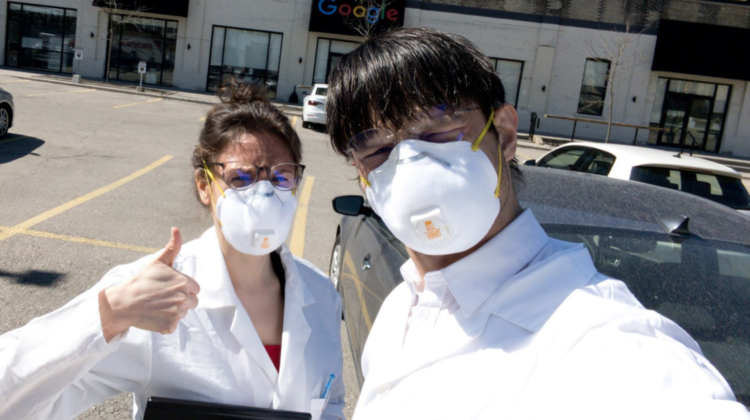
A sensor and algorithms for early detection
The company has since designed and fabricated its own sensor and created algorithms for the detection and identification of pathogens. It is now at a stage of testing its technology in the agricultural sector before extending the technology for bacteria and viruses in human health.
Resch says her applied mathematics PhD from Waterloo was certainly foundational for her company which brands itself with the mathematical symbols Π (pi), ∩ (and), ϟ (power).
“Waterloo stands amongst the giants when it comes to mathematical training at the undergraduate and graduate level,” Resch says. “We compete successfully with places like Harvard, Princeton, Cambridge, Oxford, MIT and Caltech.”
When Resch got into mathematics at Waterloo, her interest was initially in music. Her PhD thesis dealt with non-linear acoustics, its signal analysis and the production and propagation of sound waves in musical instruments. She is now an adjunct professor in the Applied Mathematics Department at the University of Waterloo.
But Resch says that mathematics is applicable everywhere and everything, from music to medicine. “Indeed, Mathematics helps you describe the world around you.”
Link of the day
Day of Commemoration of the Great Upheaval
When and Where to get support
Students can visit the Student Success Office online for supports including academic development, international student resources, immigration consulting, leadership development, exchange and study abroad, and opportunities to get involved.
Instructors looking for targeted support for developing online components for blended learning courses, transitioning remote to fully online courses, revising current online courses, and more please visit Agile Development | Centre for Extended Learning | University of Waterloo (uwaterloo.ca).
Instructors can visit the Keep Learning website to get support on adapting their teaching and learning plans for an online environment.
Course templates are available within your course in LEARN to help you build and edit your content and assignment pages quickly.
The following workshops, webinars, and events are offered by the KL team (CTE, CEL, ITMS, LIB):
-
Scholarship of Teaching and Learning (SoTL) Methods – self-directed, continuous self-enrollment course in LEARN.
-
Independent Blended Course Design (iBlend) - self-directed, continuous self-enrollment course in LEARN.
-
Copyright Overview for Waterloo Instructors and Staff - self-directed, continuous self-enrollment course in LEARN.
-
Independent Remote Course Design Essentials (iReCoDE) - self-directed, continuous self-enrollment course in LEARN.
-
Supporting Student Mental Health (for Instructors) – self-directed, continuous self-enrollment course in LEARN.
Supports are available for employees returning to campus. Visit IST’s Hybrid Work and Technology guidelines and workplace protocols to assist with the transition.
The Writing and Communication Centre has in-person and virtual services to support grad and undergrad students, postdocs and faculty with any writing or communication project. Services include one-to-one appointments, drop-ins at Dana Porter Library, online workshops, writing groups, English conversation practice, and custom in-class workshops.
Co-op students can get help finding a job and find supports to successfully work remotely, develop new skills, access wellness and career information, and contact a co-op or career advisor.
The Centre for Career Action (CCA) has services and programs to support undergrads, grad students, postdocs, alumni, and employees in figuring out what they value, what they’re good at, and how to access meaningful work, co-op, volunteer, or graduate/professional school opportunities. Questions about CCA's services? Live chat, call 519-888-4047, or stop by our front desk in the Tatham Centre 8:30 a.m. to 4:30 p.m., Monday to Friday.
Drop-in to Warrior Virtual Study Halls on Wednesdays from 5:30 p.m. to 7:00 p.m. Come together in this virtual space to set goals and work independently or in groups each week.
Renison's English Language Institute continues to offer virtual events and workshops to help students practice their English language skills.
If you feel overwhelmed or anxious and need to talk to somebody, please contact the University’s Campus Wellness services, either Health Services or Counselling Services. You can also contact the University's Centre for Mental Health Research and Treatment. Good2Talk is a post-secondary student helpline available to all students.
The Library is open with expanded hours for access to book stacks, drop-in individual study space, bookable group study rooms, drop-in access to computers and printers, book pick-up services and IST Help Desk support. Librarian consultations, Special Collections & Archives and the Geospatial Centre are available by appointment. Full details on current services and hours are available on the Library’s COVID-19 Update webpage.
The Faculty Association of the University of Waterloo (FAUW) continues to advocate for its members. Check out the FAUW blog for more information.
The University of Waterloo Staff Association (UWSA) continues to advocate for its members. Check out the UWSA blog for more information.
The Sexual Violence Prevention and Response Office (SVPRO) supports all members of the University of Waterloo campus community who have experienced, or been impacted, by sexual violence. This includes all students, staff, faculty and visitors on the main campus, the satellite campuses, and at the affiliated and federated Waterloo Institutes and Colleges. For support, email: svpro@uwaterloo.ca or visit the SVPRO website.
The Office of Indigenous Relations is a central hub that provides guidance, support, and resources to all Indigenous and non-Indigenous campus community members and oversees the University's Indigenization strategy.
The Waterloo Indigenous Student Centre, based at St. Paul’s University College, provides support and resources for Indigenous students, and educational outreach programs for the broader community, including lectures, and events.
WUSA supports for students:
Peer support - MATES, Glow Centre, RAISE, Women’s Centre - Click on one of the links to book an appointment either in person or online for the term.
Food Support Service food hampers are currently available from the Turnkey Desk 24/7 in the Student Life Centre. Drop-off locations are also open again in SLC, DC, DP, SCH, and all residences.
Co-op Connection all available online.
Centre for Academic Policy Support - CAPS is here to assist Waterloo undergraduates throughout their experience in navigating academic policy in the instances of filing petitions, grievances and appeals. Please contact them at caps@wusa.ca.
WUSA Student Legal Protection Program - Seeking legal counsel can be intimidating, especially if it’s your first time facing a legal issue. The legal assistance helpline provides quick access to legal advice in any area of law, including criminal. Just call 1-833-202-4571.
Empower Me is a confidential mental health and wellness service that connects students with qualified counsellors 24/7. They can be reached at 1-833-628-5589.
GSA-UW supports for graduate students:
The Graduate Student Association (GSA-UW) supports students’ academic and social experience and promotes their well-being.
Advising and Support - The GSA advises graduate students experiencing challenges and can help with navigating university policies & filing a grievance, appeal, or petition.
Mental Health covered by the Health Plan - The GSA Health Plan now has an 80 per cent coverage rate (up to $800/year) for Mental Health Practitioners. Your plan includes coverage for psychologists, registered social workers, psychotherapists, and clinical counselors.
Dental Care - The GSA Dental Plan covers 60 to 70 per cent of your dental costs and by visiting dental professionals who are members of the Studentcare Networks, you can receive an additional 20 to 30 per cent coverage.
Student Legal Protection Program - Your GSA fees give you access to unlimited legal advice, accessible via a toll-free helpline: +1-833-202-4571. This advice covers topics including housing disputes, employment disputes, and disputes with an academic institution.
The Graduate House: Open Monday to Tuesday 11:30 a.m. to 7:00 p.m. and Wednesday to Friday 11:30 a.m. to 9:00 p.m. We’re open to all students, faculty, staff, and community members. The Graduate House is a community space run by the GSA-UW. We’re adding new items to the menu. Graduate students who paid their fees can get discounts and free coffee.
When and Where (but mostly when)
Warriors vs. Laurier Blood Donation Battle. Join our “Waterloo Warriors” team on the Blood.ca website or app. #ItsInYouToGive
Warriors Youth Summer Day Camps, July 4 to September 2. Open to boys and girls age 5-18. Baseball, Basketball, Football, Hockey, Multi-Sport and Games & Volleyball. Register today.
UWSA vote on Updated Memorandum of Agreement (MOA), Thursday, July 14 to August 2, details and vote link sent to members by email, contact UWSA for details.
Shad Waterloo 2022 Open Day Exhibits, Thursday, July 28, 1:30 p.m. to 4:00 p.m.
August Civic Holiday, Monday, August 1, most University operations and buildings closed.
FLIGHT Virtual Summer Camp, Tuesday, August 2 to August 13. FLIGHT virtual summer camp provides a strong introduction to tech entrepreneurship to girls aged 13-18 who self-identify as Black or another underrepresented minority.
Part-Time Master of Business, Entrepreneurship and Technology Information Session, Wednesday, August 3, 12:00 p.m. to 1:00 p.m., Zoom. Registration required.
2022 Global Summit: Nanotechnology for a Healthier and Sustainable Future, Wednesday, August 10 and Thursday, August 11.
PhD oral defences
Geography and Environmental Management. Abraham Nunbogu, “Bridging the health equity gap: examining the effects of water, sanitation and hygiene (WaSH) gender-based violence on health and wellbeing in Ghana”. Supervisor, Susan Elliott. Available upon request from the Faculty of Environment, Administrator, Graduate Studies. Oral defence Monday, August 8,9:30 a.m.
English Language and Literature. Jennifer Erin Doyle, "Element Focused Inquiry: Air and Water in American Literature." Sueprvisors, Vinh Nguyen, Imre Szeman. Available upon request from the Faculty of Arts, Graduate Studies and Research Officer. Oral defence Monday, August 8, 1:00 p.m.
Chemistry. Alshymaa Ali Mohammed Ali, “Advances in two-dimensional liquid chromatography.” Supervisor, Tadeusz Gorecki. Please visit the Faculty of Science Thesis Submission Notices website for details on requesting a copy. Oral defence Wednesday, August 10, 9:00 a.m.
Psychology. Ryan Yeung, "The Persistence of Involuntary Memory: Analyzing Phenomenology, Links to Mental Health, and Content." Supervisor, Myra Fernandes. Available upon request from the Faculty of Arts, Graduate Studies and Research Officer. Oral defence Wednesday, August 10, 10:00 a.m.
Earth and Environmental Sciences. Heather Shrimpton, “Integration of non-traditional stable isotopes and synchrotron measurements.” Supervisor, David Blowes. Please visit the Faculty of Science Thesis Submission Notices website for details on requesting a copy. Oral defence Wednesday, August 10, 1:00 p.m.